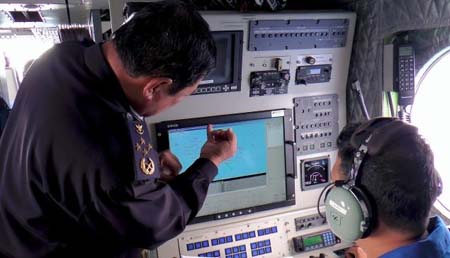 Kuala Lumpur, Mar 10: Vietnamese authorities on Sunday said they had spotted what looked like one of the doors of the missing Boeing 777 jetliner that crashed into the sea between Malaysia and Vietnam a day and a half ago. What caused the crash remained a mystery, even as authorities were checking out the identities of two passengers who were flying on stolen passports. A possible terror attack, or suicide mission, however, remained in the realm of speculation as no evidence has been found and no group has claimed responsibility so far.
Kuala Lumpur, Mar 10: Vietnamese authorities on Sunday said they had spotted what looked like one of the doors of the missing Boeing 777 jetliner that crashed into the sea between Malaysia and Vietnam a day and a half ago. What caused the crash remained a mystery, even as authorities were checking out the identities of two passengers who were flying on stolen passports. A possible terror attack, or suicide mission, however, remained in the realm of speculation as no evidence has been found and no group has claimed responsibility so far.
Malaysia's air force chief Rodzali Daud said radar indicated that the plane may have turned back, but did not give further details on which direction it went or how far it veered off course. "We are trying to make sense of this," Daud said at a news conference. "The military radar indicated that the aircraft may have made a turn back, and in some parts this was corroborated by civilian radar."
The plane, which was carrying 239 people — five Indians among them — lost contact with ground controllers off Vietnam after leaving Kuala Lumpur early Saturday morning for Beijing. The missing plane apparently fell from the sky at cruising altitude in fine weather, and the pilots were either unable or had no time to send a distress signal — unusual circumstances under which a modern jetliner operated by a professional airline would crash.
A Vietnam army officer was reported in the state-run newspaper as saying searchers in a low-flying plane had spotted an object that looked like a door from the Malaysia Airlines plane. It was found in waters about 90km south of Tho Chu island, in the same area where oil slicks were spotted on Saturday. "From this object, hopefully, (we) will find the missing plane," the officer said. Two ships from the maritime police were headed for the site.
Malaysia Airlines chief executive Ahmad Jauhari Yahya said pilots are supposed to inform the airline and traffic control authorities if the plane does a U-turn. "From what we have, there was no such distress signal or distress call per se, so we are equally puzzled," he said.
Authorities were checking on the identities of the two passengers who boarded the plane with stolen passports. On Saturday, the foreign ministries in Italy and Austria said the names of two citizens listed on the flight's flyers' list matched the names on two passports reported stolen in Thailand. "I can confirm that we have the visuals of these two people on CCTV," Malaysian transport minister Hishammuddin Hussein said at a news conference late on Sunday, adding that the footage was being examined. "We have intelligence agencies, both local and international, on board."
"Our focus now is to find the aircraft," he said, adding that finding the plane would make it easier for authorities to investigate any possible foul play.
Interpol confirmed that at least two stolen passports used by passengers on the plane were registered in its databases. It said no one had checked the databases, but added that most airlines and countries do not usually check for stolen passports. Hishammuddin said only two passengers had used stolen passports, and that earlier reports that the identities of two others were under investigation were not true.
In addition to the plane's sudden disappearance, which experts say is consistent with a possible onboard explosion, the stolen passports have strengthened concerns about terrorism as a possible cause. Al-Qaida militants have used similar tactics to try and disguise their identities.
Still, other possible causes would seem just as likely at this stage, including a catastrophic failure of the plane's engines, extreme turbulence, or pilot error or even suicide. Establishing what happened with any certainty will need data from flight recorders and a detailed examination of any debris, something that will take months if not years.
The multinational search for the missing plane is on. A total of 34 aircraft and 40 ships have been deployed to the area by Malaysia, Thailand, Australia, Singapore, Indonesia, China and the United States, in addition to Vietnam's fleet. Vietnamese air force jets spotted two large oil slicks Saturday, but it was unclear whether they were linked to the missing plane.
Two-thirds of the jet's passengers were Chinese. The rest were from elsewhere in Asia, North America and Europe.
After more than 30 hours without contact with the aircraft, Malaysia Airlines told family members they should "prepare themselves for the worst", Hugh Dunleavy, the commercial director for the airline, told reporters.
Finding traces of an aircraft that disappears over sea can take days or longer, even with a sustained search effort. Depending on the circumstances of the crash, wreckage can be scattered over many square kilometers (miles). If the plane enters the water before breaking up, there can be relatively little debris.
Malaysia Airlines has a good safety record, as does the 777, which had not had a fatal crash in its 19-year history until an Asiana Airlines plane crashed last July in San Francisco, killing three passengers.





Comments
Add new comment